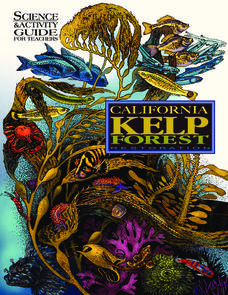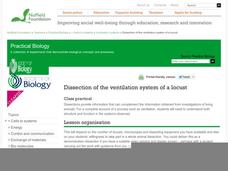Curated OER
Energy Conservation Games
Middle school physicsl science explorers play a game using dominoes that you have photocopied onto cardstock. Through the game, they familiarize themselves with the conservation of energy and the transformatin from one form to another....
Curated OER
Balloon-Powered Car
Attractive and logical instructions are provided for constructing a balloon-powered car. Young physical scientists measure the distance their car travels and record it on a pre-printed data sheet. The make alterations to improve the...
National Wildlife Federation
How Many Bison?
Math and science to the rescue! Some basic math concepts help scientists predict wildlife populations. Using tokens, groups simulate tagging a wildlife population. They then use proportions to estimate the population of the wildlife.
Dawn N . Ericson
California Kelp Forest Restoration
This unit is so cool, you won't be able to "kelp" yourself! Intended for all grades, this science and activity guide for teachers offers a unique opportunity to understand kelp's role as a valuable ecological resource. Teachers and...
Nuffield Foundation
Dissection of the Ventilation System of a Locust
Jiminy cricket! If you find yourself plagued by fear of dissection, these locust respiratory system dissection directions will walk you through everything you need to know. Teens inspect a living locust to begin with, then jump over to...
Berkshire Museum
The Three Life-Giving Sisters: Plant Cultivation and Mohican Innovation
Children gain first-hand experience with Native American agriculture while investigating the life cycle of plants with this engaging experiment. Focusing on what the natives called the Three Sisters - corn, beans, and squash - young...
Ocean and Coastal Interdisciplinary Science
The Dark Ocean
Is the ocean blue at all depths? Nope! Explore the science behind the light spectrum in deep, dark waters. The lesson recommends watching The Blue Planet: Open Ocean—The Deep, but it's not integral, or you can substitute another clip....
ARKive
Adaptations for Movement
What animals are best suited for moving around a rainforest, or a desert? Design your own animal species based on a particular habitat, focusing on the characteristics it will need for optimal movement. Great as a group lesson or...
Curated OER
Titration: Standardization of a Base and Analysis of Stomach Antacid Tablets
Titration experiments don't have to give your high schoolers a stomachache. Study the ways to titrate an acide with a base in an engaging science experiment, which involves creating solutions and performing titrations. Pupils prepare a...
University of Minnesota
Inquiry Cubes
How do you teach kids to "science" effectively? Inquiry cubes are a "sort of" puzzle with no answer—promoting even more questions! Group members work together to use the evidence on the visible sides of each cube to infer what lies on...
Chicago Botanic Garden
Meet the Naturalists
Studying plants is a full-time job—for some. After learning the ins and outs of phenology in the first three lessons in the unit, pupils explore the history of the science. The instructional activity highlights five historical...
Curated OER
Classifying Plants and Insects
Art and science come together in a lesson based on Flower Still Life by Ambrosius Bosschaert the Elder. Learners classify plants and insects in the painting by color, leaf shape, size, reproduction, and season of bloom.
Baylor College
Food Webs
Explore various ecosystems from around the world as your class discovers the interdependence of all living things. Using the provided sets of ecosystem cards, young scientists work in small groups building food webs to demonstrate the...
Baylor College
Can Nutrients in Water Cause Harm?
Ecology candidates culture pond water organisms over a few days time, then they experiment to find out how increasing nutrients affects the population. As part of a unit on water, this exploration gives your class an understanding of how...
Curated OER
Get a Leg Up
Traveling through space is an amazing experience, but it definitely takes a toll on the body. After reading an article and watching a brief video, learners perform an experiment that simulates the effects of zero gravity on the human body.
Baylor College
What's Is Soil Made Of?
It's time to roll up those sleeves and get a little dirty in the second lesson plan of this series on the science of food. Investigate where plants and animals get the minerals they need to live in this two-part exploration of soil....
Rural Science Education Program
Bees and Flowers – Partners in Pollination
Why are bees so important? After several activities where kids investigate the form and function of flowers, they learn about the different types of bees and label them. They then examine pollen under a microscope and decide which bees...
Consortium for Ocean Science Exploration and Engagement (COSEE)
Understanding the Food Web
Building on prior knowledge of the pervious lesson in the series, pupils explain the previous lesson to each other. Then they write a simple guide for a young child to read on the same topic.
Discovery Education
Fuss About Dust
Dust is everywhere around us; it's unavoidable. But what exactly is dust and are certain locations dustier than others? These are the questions students try to answer in an interesting scientific investigation. Working independently or...
Wild BC
Is Climate Change Good for Us?
Is it really that big of a deal if the global climate undergoes a little change? Young environmentalists consider this very question as they discuss in small groups the impact of different climate change scenarios on their lives, their...
Baylor College
HIV/AIDS in the United States
In the final of five lessons about HIV/AIDS, groups create presentations to share data about the infection rates in the United States, examining demographic and geographic trends over the past ten years. Depending on how much time you...
NOAA
An Ocean of Energy
Young biologists trace the path of the sun's energy through marine ecosystems in the second part of this four-lesson series. Building on prior knowledge about producers, consumers, and decomposers students are introduced to the concept...
Micron Technology Foundation
Early - Weather and Seasons
Young scientists from any region can take a scientific journey and be exposed to weather changes that include rain and snow.
Michigan State University
Bug Lyphe!
Introduce ecology classes to biodiversity and interdependence in ecosystems with a PowerPoint presentation. Then, they get up-close and personal with the invertebrate world by collecting insects, classifying them, and graphing their...
Other popular searches
- Earth Science
- Physical Science
- Life Science
- Science Project
- Science Space
- Environment Science
- History of Science
- Environmental Science
- Pe Science
- Family and Consumer Science
- Consumer Science
- Social Science

























